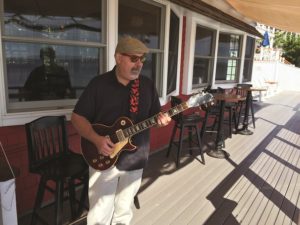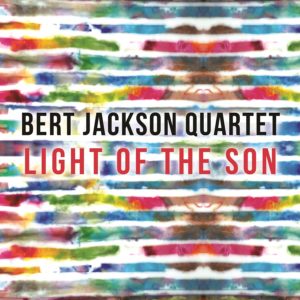One day a few years back, during a particularly snowy winter, jazz musician Bert Jackson sat on the couch in his Brewster home, picked up his guitar, and composed a song. A Latin-flavored instrumental in a minor key, “Light of the Son” was a blending of happiness and sadness, a remembrance of the joy of what once was and the regret for what is no longer.
The piece came straight out of Jackson’s sorrow, a way of working through the feelings he had after learning that the son of a close friend had died from a drug overdose.

“I’d known the kid since he was eight, so it was a particularly challenging loss,” says Jackson. “This song sort of fell out as I was working things out.”
Today, “Light of the Son” is the opening and title cut from the newly released album by the Bert Jackson Quartet, or B.J.Q., which features Jackson on guitar, Paul Lesniak on alto and tenor sax, Roe Osborn on bass, and Kareem Sanjaghi on drums. The album, the band’s second release (the first was Imaginary Journey in 2013), also includes guest appearances by Brazilian jazz pianist Fabiano DeCastro on two of the cuts. It’s available for download at bertland.com.
“The principal recording of this was done a couple of years ago. It’s just taken me a while to get the odds and ends wrapped up,” Jackson says.
Recorded at Brick Hill Studios in Orleans, the album was, with the exception of DeCastro’s contributions, done without any overdubbing.
“We did multiple takes, but it was all of us in the studio, and that’s an important thing for jazz, because you react to each other,” says Jackson, noting that the aim was to come as close as they could to a live performance. “If you went to hear us play Sunday jazz brunch at the Red Inn in Provincetown, that’s what you’d hear,” says Jackson of their steady gig for the past eight years. “We wanted to capture that.”
The live feel of the album is particularly welcome during these days of social distancing and self-isolation, when going out to a concert or club is not an option. During this time, Jackson has also been sharing his music through his Covid-19 project, a series of music videos he’s been creating weekly. They can be viewed on his bertland.com website.

A mix of standards and original material, Light of the Son includes the jazz classics “Willow Weep for Me,” “Nica’s Dream,” “September in the Rain,” “Tangerine,” and “Summertime.” The band did its own arranging, which resulted in some interesting touches, such as the intro to Michael Jackson’s “Billie Jean” that Sanjaghi uses to kick off “Summertime.”
Original songs include Osborn’s “Just the Wine Talking” and “More Than I Can Chew,” two numbers with a Mose Allison feel.
Jackson contributed three tunes to the album. One, the Brazilian jazz number “Nunca Neva No Rio” (“It Never Snows in Rio”), also written during that hard winter, was inspired by Jackson’s daydream of being in a more temperate clime. Another, “Soul Plane Blues,” which features Jackson on vocals, was written by him close to 40 years ago.
“It’s a blues song about where music comes from,” Jackson says. “Does it come from the soul plane? How does it come to us and how does it come into our lives?”
Then, of course, there’s “Light of the Son.” The song, spurred by the opioid epidemic and created to bring comfort to those who have lost loved ones, is a salve to the soul for those in mourning and for everyone living now in the midst of the coronavirus pandemic.
“It’s kind of meant to be more hopeful,” Jackson says. “We may have lost these people, but we have the memory of the fact that they were here and they were part of our lives. And the fact that they’re gone doesn’t mean they’re not a part of our lives anymore, because they’re part of our lives inside.”



